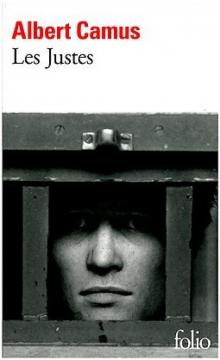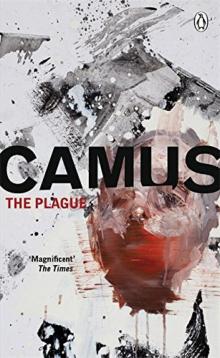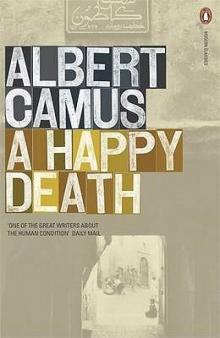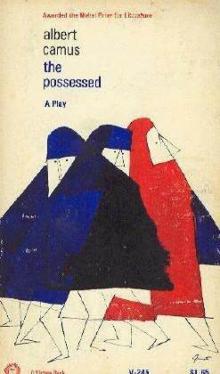- Home
- Albert Camus
The plague
The plague Read online
THE PLAGUE
It is as reasonable to represent one kind of imprisonment by another, as it is to represent anything that really exists by that which exists not.
DANIEL DEFOE
THE
PLAGUE
BY
Albert Camus
TRANSLATED FROM THE FRENCH BY
Stuart Gilbert
THE MODERN LIBRARY • New York
Copyright 1948 by Stuart Gilbert
All rights reserved under International and Pan-American Copyright Conventions. Published in the United States by Random House, Inc., New York. Originally published in French as La Peste. Copyright 1947 by Librairie Gallimard. By arrangement with Librairie Gallimard.
THE MODERN LIBRARY
is published by random house, inc.
Manufactured in the United States of America
CONTENTS
part I page 3
part II page 61
part III page 151
part IV page 169
part V page 241
PART I
T
he unusual events described in this chronicle occurred in 194- at Oran. Everyone agreed that, considering their somewhat extraordinary character, they were out of place there. For its ordinariness is what strikes one first about the town of Oran, which is merely a large French port on the Algerian coast, headquarters of the Prefect of a French Department.
The town itself, let us admit, is ugly. It has a smug, placid air and you need time to discover what it is that makes it different from so many business centers in other parts of the world. How to conjure up a picture, for instance, of a town without pigeons, without any trees or gardens, where you never hear the beat of wings or the rustle of leaves—a thoroughly negative place, in short? The seasons are discriminated only in the sky. All that tells you of spring's coming is the feel of the air, or the baskets of flowers brought in from the suburbs by peddlers; it's a spring cried in the marketplaces. During the summer the sun bakes the houses bone-dry, sprinkles our walls with grayish dust, and you have no option but to survive those days of fire indoors, behind closed shutters. In autumn, on the other hand, we have deluges of mud. Only winter brings really pleasant weather.
Perhaps the easiest way of making a town's acquaintance is to ascertain how the people in it work, how they love, and how they die. In our little town (is this, one wonders, an effect of the climate?) all three are done on much the same lines, with the same feverish yet casual air. The truth is that everyone is bored, and devotes himself to cultivating habits. Our citizens work hard, but solely with the object of getting rich. Their chief interest is in commerce, and their chief aim in life is, as they call it, "doing business." Naturally they don't eschew such simpler pleasures as love-making, seabathing, going to the pictures. But, very sensibly, they reserve these pastimes for Saturday afternoons and Sundays and employ the rest of the week in making money, as much as possible. In the evening, on leaving the office, they forgather, at an hour that never varies, in the cafes, stroll the same boulevard, or take the air on their balconies. The passions of the young are violent and short-lived; the vices of older men seldom range beyond an addiction to bowling, to banquets and "socials," or clubs where large sums change hands on the fall of a card.
It will be said, no doubt, that these habits are not peculiar to our town; really all our contemporaries are much the same. Certainly nothing is commoner nowadays than to see people working from morn till night and then proceeding to fritter away at card-tables, in cafes and in small-talk what time is left for living. Nevertheless there still exist towns and countries where people have now and then an inkling of something different. In general it doesn't change their lives. Still, they have had an intimation, and that's so much to the good. Oran, however, seems to be a town without intimations; in other words, completely modern. Hence I see no need to dwell on the manner of loving in our town. The men and women consume one another rapidly in what is called "the act of love," or else settle down to a mild habit of conjugality. We seldom find a mean between these extremes. That, too, is not exceptional. At Oran, as elsewhere, for lack of
time and thinking, people have to love one another without knowing much about it.
What is more exceptional in our town is the difficulty one may experience there in dying. "Difficulty," perhaps, is not the right word, 'discomfort" would come nearer. Being ill :s never agreeable but there are towns that stand by you, so to speak, when you are sick; in which you can, after a fashion, let yourself go. An invalid needs small attentions, he likes to have something to rely on, and that's natural enough. But at Oran the violent extremes of temperature, the exigencies of business, the uninspiring surroundings, the sudden nightfalls, and the very nature of its pleasures call for good health. An invalid feels out of it there. Think what it must be for a dying man, trapped behind hundreds of walls all sizzling with heat, while the whole population, sitting in cafes or hanging on the telephone, is discussing shipments, bills of lading, discounts! It will then be obvious what discomfort attends death, even modern death, when it waylays you under such conditions in a dry place.
These somewhat haphazard observations may give a fair idea of what our town is like. However, we must not exaggerate. Really, all that was to be conveyed was the banality of the town's appearance and of life in it. But you can get through the days there without trouble, once you have formed habits. And since habits are precisely what our town encourages, all is for the best. Viewed from this angle, its life is not particularly exciting; that must be admitted. But, at least, social unrest is quite unknown among us. And our frank-spoken, amiable, and industrious citizens have always inspired a reasonable esteem in visitors. Treeless, glamour-less, soulless, the town of Oran ends by seeming restful and, after a while, you go complacently to sleep there.
It is only fair to add that Oran is grafted on to a unique landscape, in the center of a bare plateau, ringed with luminous hills and above a perfectly shaped bay. All we may regret is the town's being so disposed that it turns its back on
the bay, with the result that it's impossible to see the sea, you always have to go to look for it.
Such being the normal life of Oran, it will be easily understood that our fellow citizens had not the faintest reason to apprehend the incidents that took place in the spring of the year in question and were (as we subsequently realized) premonitory signs of the grave events we are to chronicle. To some, these events will seem quite natural; to others, all but incredible. But, obviously, a narrator cannot take account of these differences of outlook. His business is only to say: "This is what happened," when he knows that it actually did happen, that it closely affected the life of a whole populace, and that there are thousands of eyewitnesses who can appraise in their hearts the truth of what he writes.
In any case the narrator (whose identity will be made known in due course) would have little claim to competence for a task like this, had not chance put him in the way of gathering much information, and had he not been, by the force of things, closely involved in all that he proposes to narrate. This is his justification for playing the part of a historian. Naturally, a historian, even an amateur, always has data, personal or at second hand, to guide him. The present narrator has three kinds of data: first, what he saw himself; secondly, the accounts of other eyewitnesses (thanks to the part he played, he was enabled to learn their personal impressions from all those figuring in this chronicle); and, lastly, documents that subsequently came into his hands. He proposes to draw on these records whenever this seems desirable, and to employ them as he thinks best. He also proposes . . .
But perhaps the time has come to drop preliminaries and cautionary remarks and to launch into the narrative proper. The account of the first days needs giving in some d
etail.
W
hen leaving his surgery on the morning of April 16, Dr. Bernard Rieux felt something soft under his foot. It was a dead rat lying in the middle of the landing. On the spur of the moment he kicked it to one side and, without giving it a further thought, continued on his way downstairs. Only when he was stepping out into the street did it occur to him that a dead rat had no business to be on his landing, and he turned back to ask the concierge of the building to see to its removal. It was not until he noticed old M. Michel's reaction to the news that he realized the peculiar nature of his discovery. Personally, he had thought the presence of the dead rat rather odd, no more than that; the concierge, however, was genuinely outraged. On one point he was categorical: "There weren't no rats here." In vain the doctor assured him that there was a rat, presumably dead, on the second-floor landing; M. Michel's conviction wasn't to be shaken. There "weren't no rats in the building," he repeated, so someone must have brought this one from outside. Some youngster trying to be funny, most likely.
That evening, when Dr. Rieux was standing in the entrance, feeling for the latch-key in his pocket before starting up the stairs to his apartment, he saw a big rat coming toward him from the dark end of the passage. It moved uncertainly, and its fur was sopping wet. The animal stopped and seemed to be trying to get its balance, moved forward again toward the doctor, halted again, then spun round on itself with a little squeal and fell on its side. Its mouth was
slightly open and blood was spurting from it. After gazing at it for a moment, the doctor went upstairs.
He wasn't thinking about the rat. That glimpse of spurting blood had switched his thoughts back to something that had been on his mind all day. His wife, who had been ill for a year now, was due to leave next day for a sanatorium in the mountains. He found her lying down in the bedroom, resting, as he had asked her to do, in view of the exhausting journey before her. She gave him a smile.
"Do you know, I'm feeling ever so much better!" she said.
The doctor gazed down at the face that turned toward him in the glow of the bedside lamp. His wife was thirty, and the long illness had left its mark on her face. Yet the thought that came to Rieux's mind as he gazed at her was: "How young she looks, almost like a little girl!" But perhaps that was because of the smile, which effaced all else.
"Now try to sleep," he counseled. "The nurse is coming at eleven, you know, and you have to catch the midday train."
He kissed the slightly moist forehead. The smile escorted him to the door.
Next day, April 17, at eight o'clock the concierge buttonholed the doctor as he was going out. Some young scallywags, he said, had dumped three dead rats in the hall. They'd obviously been caught in traps with very strong springs, as they were bleeding profusely. The concierge had lingered in the doorway for quite a while, holding the rats by their legs and keeping a sharp eye on the passers-by, on the off chance that the miscreants would give themselves away by grinning or by some facetious remark. His watch had been in vain.
"But I'll nab 'em all right," said M. Michel hopefully.
Much puzzled, Rieux decided to begin his round in the outskirts of the town, where his poorer patients lived. The scavenging in these districts was done late in the morning and, as he drove his car along the straight, dusty streets, he cast glances at the garbage cans aligned along the edge of the
sidewalk. In one street alone the doctor counted as many as a dozen rats deposited on the vegetable and other refuse in the cans.
He found his first patient, an asthma case of long standing, in bed, in a room that served as both dining-room and bedroom and overlooked the street. The invalid was an old Spaniard with a hard, rugged face. Placed on the coverlet in front of him were two pots containing dried peas. When the doctor entered, the old man was sitting up, bending his neck back, gasping and wheezing in his efforts to recover his breath. His wife brought a bowl of water.
"Well, doctor," he said, while the injection was being made, "they're coming out, have you noticed?"
"The rats, he means," his wife explained. "The man next door found three."
"They're coming out, you can see them in all the trash cans. It's hunger!"
Rieux soon discovered that the rats were the great topic of conversation in that part of the town. After his round of visits he drove home.
"There's a telegram for you, sir, upstairs," M. Michel informed him.
The doctor asked him if he'd seen any more rats.
"No," the concierge replied, "there ain't been any more. I'm keeping a sharp lookout, you know. Those youngsters wouldn't dare when I'm around."
The telegram informed Rieux that his mother would be arriving next day. She was going to keep house for her son during his wife's absence. When the doctor entered his apartment he found the nurse already there. He looked at his wife. She was in a tailor-made suit, and he noticed that she had used rouge. He smiled to her.
"That's splendid," he said. "You're looking very nice."
A few minutes later he was seeing her into the sleeping-car. She glanced round the compartment.
"It's too expensive for us really, isn't it?"
"It had to be done," Rieux replied.
"What's this story about rats that's going round?"
"I can't explain it. It certainly is queer, but it'll pass."
Then hurriedly he begged her to forgive him; he felt he should have looked after her better, he'd been most remiss. When she shook her head, as if to make him stop, he added: "Anyhow, once you're back everything will be better. We'll make a fresh start."
"That's it!" Her eyes were sparkling. "Let's make a fresh start."
But then she turned her head and seemed to be gazing through the car window at the people on the platform, jostling one another in their haste. The hissing of the locomotive reached their ears. Gently he called his wife's first name; when she looked round he saw her face wet with tears.
"Don't," he murmured.
Behind the tears the smile returned, a little tense. She drew a deep breath.
"Now off you go! Everything will be all right."
He took her in his arms, then stepped back on the platform. Now he could only see her smile through the window.
"Please, dear," he said, "take great care of yourself."
But she could not hear him.
As he was leaving the platform, near the exit he met M. Othon, the police magistrate, holding his small boy by the hand. The doctor asked him if he was going away.
Tall and dark, M. Othon had something of the air of what used to be called a man of the world, and something of an undertaker's assistant.
"No," the magistrate replied, "I've come to meet Madame Othon, who's been to present her respects to my family."
The engine whistled.
"These rats, now—" the magistrate began.
Rieux made a brief movement in the direction of the train, then turned back toward the exit.
"The rats?" he said. "It's nothing."
The only impression of that moment which, afterwards, he could recall was the passing of a railroadman with a box full of dead rats under his arm.
Early in the afternoon of that day, when his consultations were beginning, a young man called on Rieux. The doctor gathered that he had called before, in the morning, and was a journalist by profession. His name was Raymond Rambert. Short, square-shouldered, with a determined-looking face and keen, intelligent eyes, he gave the impression of someone who could keep his end up in any circumstances. He wore a sports type of clothes. He came straight to the point. His newspaper, one of the leading Paris dailies, had commissioned him to make a report on the living-conditions prevailing among the Arab population, and especially on the sanitary conditions.
Rieux replied that these conditions were not good. But, before he said any more, he wanted to know if the journalist would be allowed to tell the truth.
"Certainly," Rambert replied.
"I mean," Rieux explained, "would you be allowed to publi
sh an unqualified condemnation of the present state of things?"
"Unqualified? Well, no, I couldn't go that far. But surely things aren't quite so bad as that?"
"No," Rieux said quietly, they weren't so bad as that. He had put the question solely to find out if Rambert could or couldn't state the facts without paltering with the truth. "I've no use for statements in which something is kept back," he added. "That is why I shall not furnish information in support of yours."
The journalist smiled. "You talk the language of Saint-Just."
Without raising his voice Rieux said he knew nothing about that. The language he used was that of a man who was sick and tired of the world he lived in—though he had
much liking for his fellow men—and had resolved, for his part, to have no truck with injustice and compromises with the truth.
His shoulders hunched, Rambert gazed at the doctor for some moments without speaking. Then, "I think I understand you," he said, getting up from his chair.
The doctor accompanied him to the door.
"It's good of you to take it like that," he said.
"Yes, yes, I understand," Rambert repeated, with what seemed a hint of impatience in his voice. "Sorry to have troubled you."
When shaking hands with him, Rieux suggested that if he was out for curious stories for his paper, he might say something about the extraordinary number of dead rats that were being found in the town just now.
"Ah!" Rambert exclaimed. "That certainly interests me."
On his way out at five for another round of visits, the doctor passed on the stairway a stocky, youngish man, with a big, deeply furrowed face and bushy eyebrows. He had met him once or twice in the top-floor apartment, which was occupied by some male Spanish dancers. Puffing a cigarette, Jean Tarrou was gazing down at the convulsions of a rat dying on the step in front of him. He looked up, and his gray eyes remained fixed on the doctor for some moments; then, after wishing him good day, he remarked that it was rather odd, the way all these rats were coming out of their holes to die.

 Les Justes
Les Justes The Sea Close By
The Sea Close By The Stranger
The Stranger The Rebel: An Essay on Man in Revolt
The Rebel: An Essay on Man in Revolt The plague
The plague A Happy Death
A Happy Death The Myth of Sisyphus and Other Essays
The Myth of Sisyphus and Other Essays The Fall
The Fall Resistance, Rebellion, and Death
Resistance, Rebellion, and Death The First Man
The First Man The Possessed
The Possessed Resistance, Rebellion and Death: Essays
Resistance, Rebellion and Death: Essays